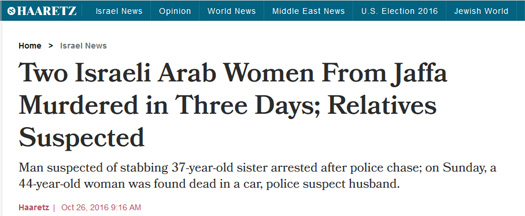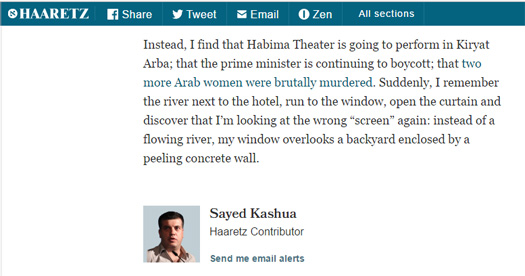Nov. 2, 2016 Update Appended to End of Article: Haaretz Adds Hyperlink About Murdered Arab Women
“I don’t need Jewish historians to tell me about the Nakba” is the headline of Sayed Kashua’s Haaretz column Friday in which he lashes out at alleged Israeli dishonesty: “The same stories, the same lies, the same machinery of self-justification.” Ironically, in this very column, it is Kashua who misrepresents events from both 1948 and last week.
Kashua provides specific, personal examples to rebut what he cites as Israeli self-justification:
Until then, I’ll just have to wait patiently for the Israelis to conclude their discussions in order to decide whether to believe or not to believe that my grandfather was killed while tending to grapes, and whether all of the stories I heard about fierce attacks on Tira, my village — that were miraculously repulsed, thus averting massacre and expulsion — were fictions concocted by the Arab imagination. I’ll have to wait until then in order to know whether my wife’s family abandoned the village of Miska in 1948 of its own free will for a picnic.
Were Tira and Miska, where Kashua’s family and his wife’s family had lived during the 1948 war, peaceful, quiet locations, where innocent farmers were arbitrarily killed and residents were forced from their homes for no apparent reason?
Seventy years on, Kashua persists with the Palestinian penchant to dissemble as completely hapless victims with no responsibility for the war and refugee problem that ensued. But, for the benefit of Kashua’s readers, here are the facts concerning Tira and Miska in the years 1936 and 1948.
In Tira, innocent farmers were not killed arbitrarily as they were “tending to grapes” in an otherwise pastoral, quite scene. For many years, Tira was a center of hostile activity against the pre-state Israel. During the Arab Revolt of 1936-39, the village was the base for hostile Arab elements. During the 1948 war it served as the base of the Arab Liberation Army forces under the command of Fauzi al-Qawuqji and regular Iraqi troops who came to destroy the nascent Jewish state.
During the 1948 war, fighters from Tira repeatedly and brutally attacked the neighborhing Kibbutz Ramat Hakovesh. Dozens of Alexandroni Brigade fighters from the Haganah defending Jewish communities were killed in the battle against the Circassian division of al-Qawuqji’s Arab Liberation Army, their bodies mutilated. The bodies of four Jewish soldiers were never found.
Elsewhere, Kashua has been more forthcoming about the circumstances of war surrounding his grandfather’s death. For instance, he wrote in The Guardian in 2014 “how my grandfather was killed in the battle over Tira in 1948.” In that account, he does not mention grapes. Unlike in his piece in Haaretz Friday, in The Guardian he acknowledged that a battle between two sides was underway and that his grandfather was killed in that context.
Miska, the village of Kashua’s wife’s family, was also involved in attacks against Kibbutz Ramat Kavosh and other Jewish communities in the Sharon area. In 1936, the Hebrew paper Davar reported Miska residents uprooted an orchard of 400 trees. After two months of repeated, failed attacks, the Hebrew press dubbed the village “the murderers’ den.”
Likewise, in the 1948 war, residents of Miska continued their efforts to kill Jews. As Professor Benny Morris (a “Jewish historian,” and therefore suspect in Kashua’s eyes) wrote in his book The Birth of The Palestinian Refugee Problem, “Miska’s militiamen and irregulars had for weeks sniped at, and skirmished with, the Jewish settlement of Ramat Hakovesh” (page 119).
Revisionism: 2016
It’s not only the events of 1948 that Kashua subjects to revisionism and manipulation. Returning to the present at the end of his column, he writes:
Instead, I find that Habima Theater is going to perform in Kiryat Arba; that the prime minister is continuing to boycott; that two more Arab women were brutally murdered. Suddenly, I remember the river next to the hotel, run to the window, open the curtain and discover that I’m looking at the wrong “screen” again: instead of a flowing river, my window overlooks a backyard enclosed by a peeling concrete wall. (Emphasis added.)
Sayed’s column is a litany of alleged Israeli wrongdoings past and present (the brutal murder of his grandfather while picking grapes, his grandmother’s flight, “more settlements, killing and theft,” Jewish lordship, occupation, etc), and therefore any reader not completely up to date with Israeli current events would surely understand that Israelis brutally murdered two Arab women last week.
But that was not the case. A hyperlink on the Hebrew digital edition (which does not appear in the English article) indicates that Kashua is referring to an Israeli Arab woman in Jaffa who was, by all accounts, killed by her brother, and another woman found dead in a car along with her injured husband, who is the police’s suspect. Haaretz‘s coverage from last week of these two murders are clear that the women are reportedly victims of domestic violence and not examples of Israeli violence against Arabs.

CAMERA yesterday contacted Haaretz editors to request a clarification about the two murdered women in both the print and digital
versions of Kashua’s article. Simply adding a link to the original article about the women’s murders does not address the misrepresentation in the print edition. Moreover, many readers who read the article online will not bother with clicking on a link and will therefore falsely believe that Israelis murdered the women.
versions of Kashua’s article. Simply adding a link to the original article about the women’s murders does not address the misrepresentation in the print edition. Moreover, many readers who read the article online will not bother with clicking on a link and will therefore falsely believe that Israelis murdered the women.
Stay tuned for an update.
For a Hebrew version of this article, please see Presspectiva, CAMERA’s site.
Following communication from CAMERA’s Israel office, Haaretz editors have added a hyperlink to the reference to “two more Arab women were brutally murdered.” The hyperlink is to Haaretz‘s news story about the murders (“Two Israeli Arab Women From Jaffa Murdered in Three Days; Relatives Suspected“). As noted earlier, most readers don’t bother to click on hyperlinks, and thus, even with the added hyperlink, would still understand from Kashua’s column that Israeli Jews were responsible for the murders. Moreover, adding a hyperlink to the digital version does not address the misrepresentation in the print edition. CAMERA continues to urge Haaretz to publish a clarification in both editions making clear that, contrary to the column’s clear implication, Israeli Jews were not believed to be responsible for the murders, apparently instances of domestic violence.
As of this writing, the updated article including the hyperlink appears as follows:

